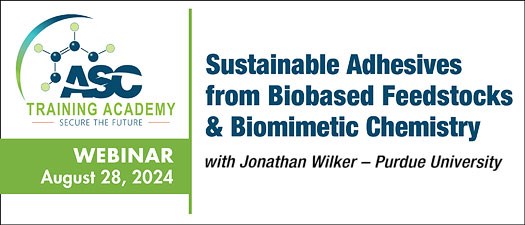Sustainable Adhesives from Biobased Feedstocks & Biomimetic Chemistry
You will receive an email with a link to the GoToWebinar form once your registration is processed
Event Details
Abstract:
Modern adhesives have excellent performance but create environmental issues owing to inabilities to debond substrates, hinderance of materials recycling, and contributions to ocean microplastics. The chemistry of adhesives in sea creatures, such as mussels and oysters, is guiding our efforts to develop new classes of sustainable materials. When combined with catechol chemistry from shellfish, both proteins and vegetable oils can provide the basis for new high-performance adhesives. Bond strengths can compare with epoxies, costs can be low, and precursors are already available on train scale scales. Fundamental studies of how sea creatures stick is now yielding adhesives that can be derived from fully sustainable feedstocks.
Objectives:
- Environmental problems created by modern adhesives.
- Commercial intransigence regarding shifting toward sustainability.
- Biomimicry principles for creating adhesives.
- New fully bio-based adhesives being developed.
- Commercial potential for sustainable adhesives.
Agenda:
- Modern adhesive problems, the needs for sustainability, and barriers to adoption.
- Biomimicry in the design of new adhesives.
- Combining biomimicry with bio-based feedstocks.
- Presentation of new polymer, protein, and soy oil-based systems.
- Future commercial impact of sustainably sourced adhesives.
Who Should Attend:
This is an ideal webinar for all markets looking to find sustainable adhesive solution for their applications. Professionals in business development, R&D, scientists, chemists will learn about the biobased adhesives and their properties and applications.
SPEAKER
Jonathan Wilker
Purdue University

Jon grew up in the Boston area and was often taken to the beach by his parents. Now at Purdue, his research program focuses on materials produced by marine organisms. A particular emphasis is the adhesives and cements produced by mussels and oysters for sticking to rocks. Ongoing efforts include characterization of these marine biological materials, developing synthetic polymer mimics, and designing applications for these new materials. Projects are often inspired by what is seen while out scuba diving.
1991: B.S. in Chemistry, University of Massachusetts at Amherst; 1996: Ph.D. in Chemistry, Massachusetts Institute of Technology; 1996-1999: Postdoc, California Institute of Technology; 1999-present: Professor at Purdue University

